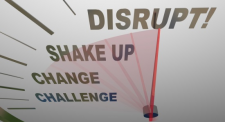
When the disruptor becomes the disrupted
The industrial action taken by taxi drivers in Paris a couple of weeks ago once again showed that the change caused by industry disruptors has a real face, and that change invariably causes pain.
Companies like Uber and Airbnb are allowing a more efficient use of otherwise latent capital capacity. These technologies also take advantages of economic inefficiencies in traditional industry, usually brought about by regulation, which can give the disruptor a cost advantage. In the case of the Australian taxi industry, it is the excessively high license costs that result in high lease charges for drivers and prices for consumers.
However, over time, technology has the ability to disrupt even the original disruptor.
A few days ago, CNBC reported on a new test track that opened during the week in Ann Arbor Michigan. The test track, called M City, replicates an urban environment and will be used by the major car manufacturing companies to develop self-driving car technology in conjunction with the University of Michigan.
The development of self-driving cars is not exactly new. Google has been working on the technology for years, with its prototypes having logged millions of miles of testing, mainly around Silicon Valley.
CNBC reported that cars with some self-driving features are expected to be released into the market between 2016 and 2018, while fully automated cars are expected in some cities between 2020 and 2025, with broader availability from 2025.
This technology, if successful, will significantly impact a number of industries.
Looking at the taxi and ride sharing industries in particular, what will be the value of a taxi license if anyone can arrange for his or her own car to come and pick them up when required, irrespective of where they are? This would not just impact the value of taxi licenses, but also the demand for Uber.
Another industry that could get caught in the firing line is the automotive insurance industry. If human error can be eliminated from driving, is it possible to have an “at fault” accident? This doesn’t mean accidents won’t happen (it does take two to tango after all), but if the system works, there shouldn’t be a situation where the self-driving car has caused the accident. If it has, is the ultimate recourse to the owner of the car, or the car manufacturer due to the reasonable expectations required under Australian consumer law. If it’s the manufacturer, the owner wouldn’t be liable and therefore would not need third party insurance.
Given automotive insurance is a large part of the earnings base of the major listed insurance companies, self-driving cars could result in these industries going into structural decline in the longer term.
Similarly less car parking capacity will be required, as self-driving vehicles can drop off passengers and return home. This would impact property values.
The implications for the road freight industries is also significant, with less downtime for capacity if drivers are no longer required.
Of course, the roads will not convert to self-driving vehicles overnight, it will take decades. However, it is worth considering what this sort of technology will do to overall demand in a number of existing industries, and therefore their annual growth rate, or should I say, rate of decline.
This post was contributed by a representative of Montgomery Investment Management Pty Limited (AFSL No. 354564). The principal purpose of this post is to provide factual information and not provide financial product advice. Additionally, the information provided is not intended to provide any recommendation or opinion about any financial product. Any commentary and statements of opinion however may contain general advice only that is prepared without taking into account your personal objectives, financial circumstances or needs. Because of this, before acting on any of the information provided, you should always consider its appropriateness in light of your personal objectives, financial circumstances and needs and should consider seeking independent advice from a financial advisor if necessary before making any decisions. This post specifically excludes personal advice.
INVEST WITH MONTGOMERY
Roger, as a UK expat, I can tell you that the French like nothing more than a good strike.
Channel Tunnel ? Block it.
EU subsidies for apples just got slashed ? Drive some tractors around the Champs-Élysées and cause traffic mayhem to get your point across.
This is nothing new !
Point made Chris. I heard one radio report in London suggest that what France needs is Winston Churchill!
Hi Roger
Good article.
A couple of points..
Uber’s game plan embraces driverless cars.
Car ownership in cities will drastically decline – one driverless taxi will replace many private cars.
Keep up the good work.